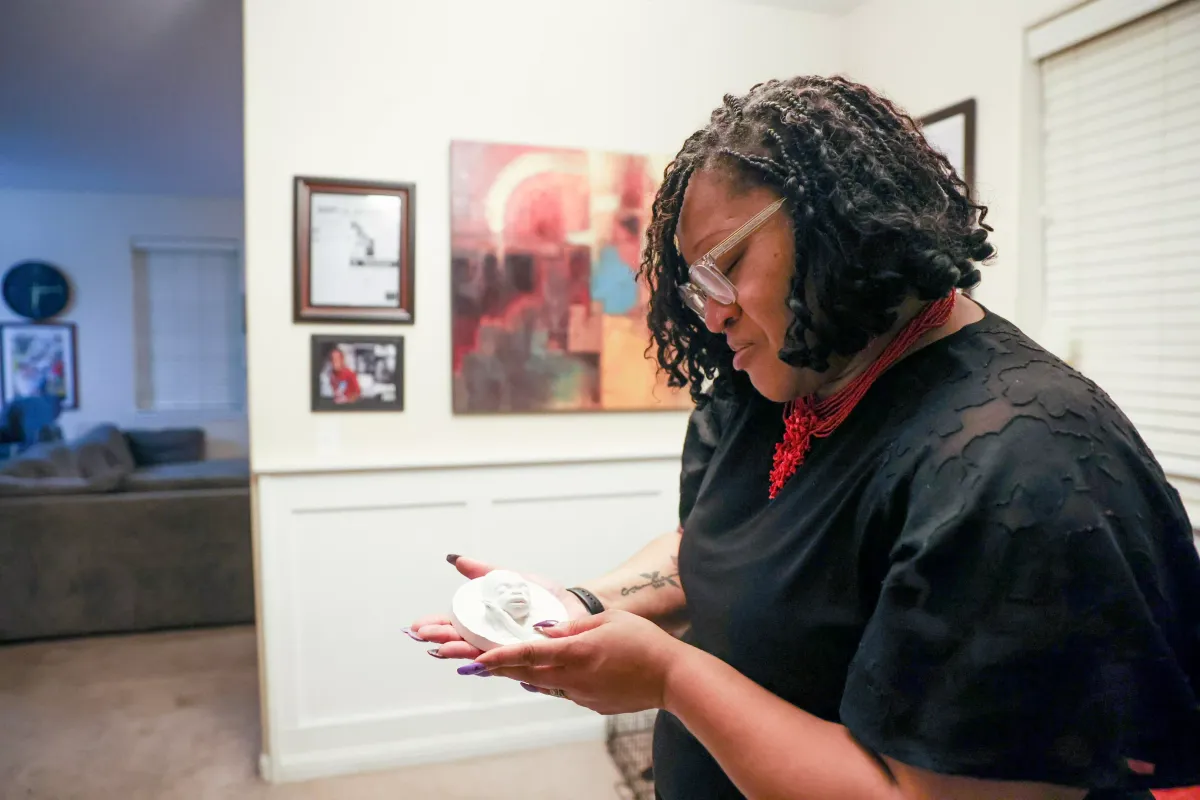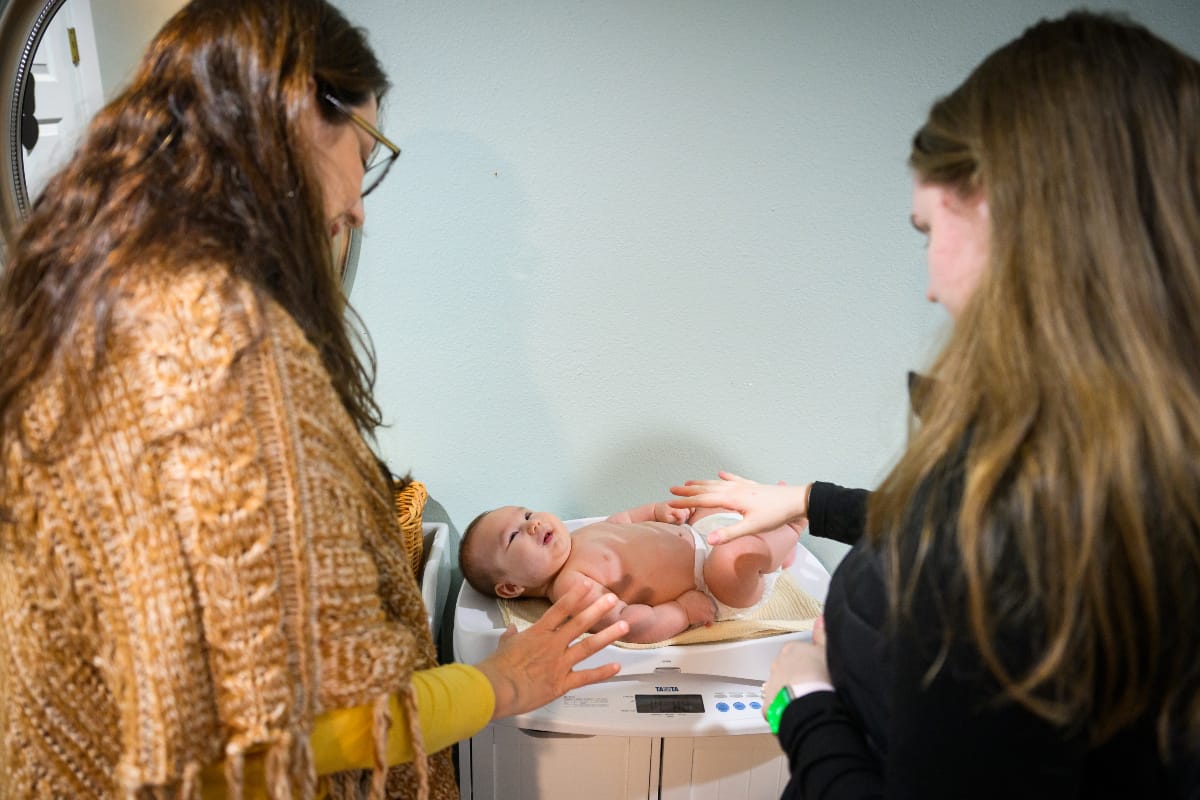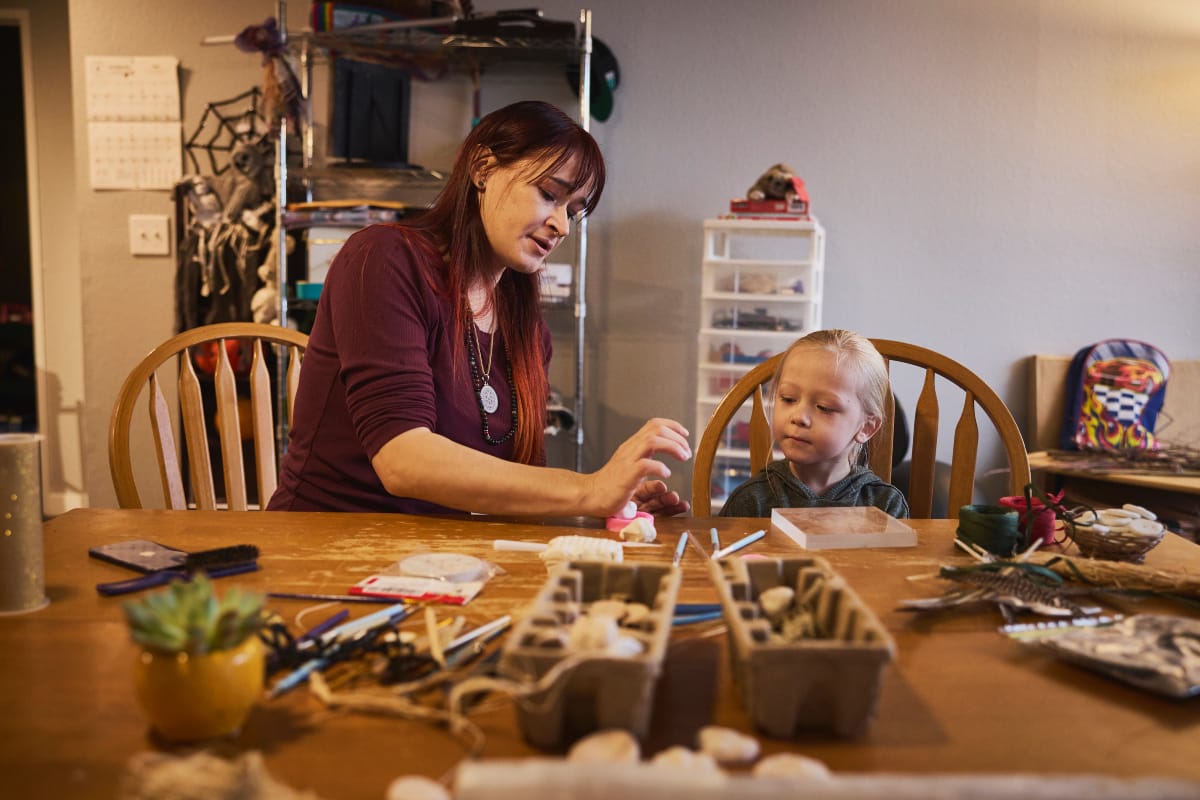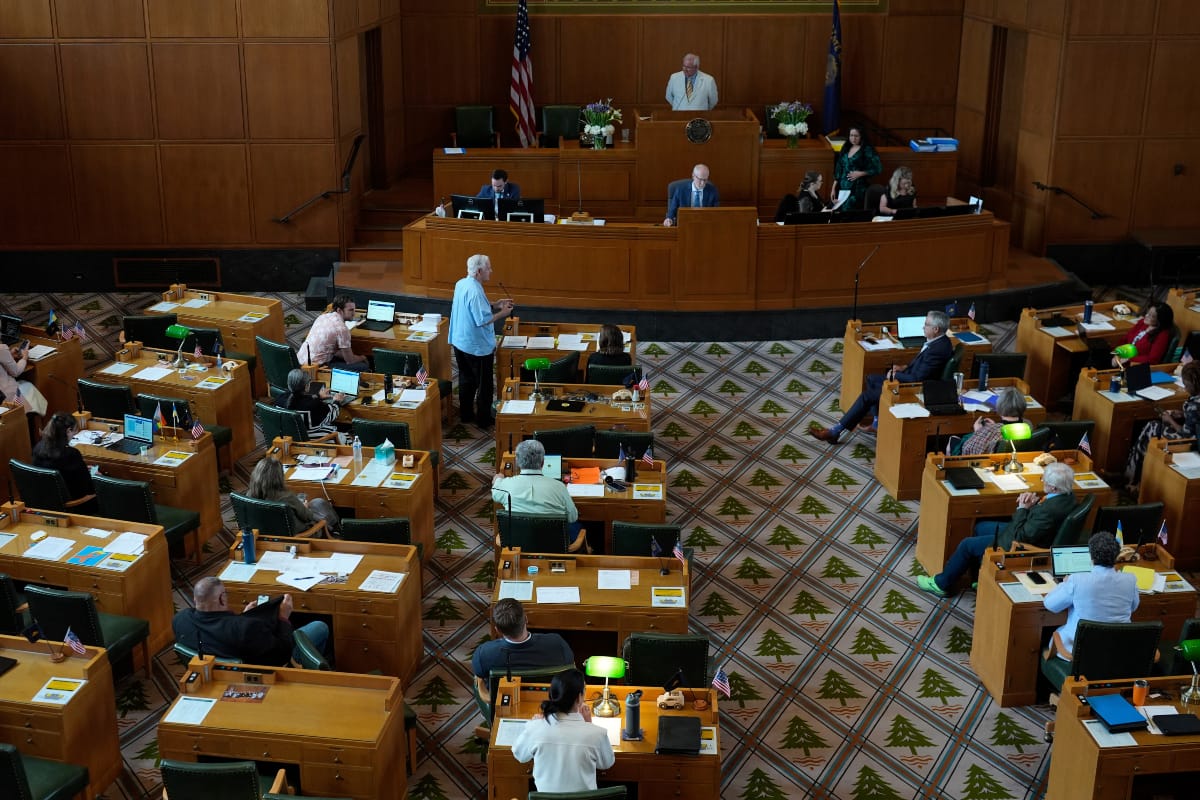Free training: How to access police employment & misconduct data in the PNW
If you cover criminal justice in the Pacific Northwest — or want to — we’re hosting a free virtual training that may be useful to you and your newsroom
A new law is aimed at supporting doula and lactation workers, but many say the success of those reforms depends on whether the state can fix persistent payment problems

This article was produced with support from the USC Annenberg Center for Health Journalism’s 2025 Impact Fund for Reporting on Health Equity and Health Systems as well as the Center's engagement initiative.
After four years running breastfeeding support groups and training to get her lactation consultant certification, Beth Waters was excited in 2020 to launch a nonprofit in a small city east of Portland.
Oregon appeared to be a prime location: The state had decided that year to make lactation consultants, who teach parents how to breastfeed and overcome complications, eligible to bill Medicaid. The change was meant to increase access to breastfeeding assistance among groups who more commonly struggle to start or continue, including women of color and low-income parents.
But only two years later, she had to close the nonprofit. Though she was eligible to bill Medicaid, Waters’ claims for reimbursement were constantly rejected by local organizations administering Medicaid benefits. Because she didn’t want to charge families for her services — and couldn’t in the case of Medicaid clients — she often wasn’t getting paid at all.
“It’s just not sustainable if you can’t bill for services,” Waters said. “And we were not about to when we’re trying to help people who are rural and can’t afford to pay a lactation consultant.”
Oregon has led the charge among states to expand access to birth workers shown to improve the mental health and wellbeing of parents, opening up Medicaid to doulas in 2014 and to lactation consultants in 2020. But years into that effort, professionals say their inability to get paid remains one of the most persistent obstacles to providing care to low-income families. Rejected claims, delayed payments and the burnout from battling insurers are common reasons why people stop taking Medicaid clients or give up the work, according to dozens of doulas and lactation consultants who responded to a survey or spoke to InvestigateWest.
Studies by the Oregon Doula Association in 2018 and 2025 repeatedly flagged similar administrative and billing barriers, and some birth workers said they’ve spoken up for years with little response from the Oregon Health Authority, which oversees Medicaid.
Oregon Health Authority officials said they’re learning more about the details of billing disputes through conversations with lactation and doula associations but don’t yet have plans in place to solve the problems.

Across the nation, low-income families and women of color are less likely to access affordable, culturally appropriate support during and after birth. They also have worse birth and pregnancy outcomes, including higher rates of infant and maternal mortality and lower breastfeeding rates. Mental health problems and substance use disorders are killing more mothers than any other cause in Oregon, highlighting the need for stronger support systems. Doulas and lactation counselors are viewed by many as part of that solution.
“We’re really trying to save lives out here,” said Asia Rubio, lead lactation consultant for Sacred Roots, a Portland-based network of doula and lactation support for Black and multiethnic families.
A new state law taking effect next year is intended to help, but many say its success hinges on its implementation and whether the state can fix the longstanding billing issues that make it hard for birth workers to sustain their work. It will require commercial insurance plans to cover prenatal and postpartum doula services and open up $1 million in grants for organizations that provide birth and postpartum support to underserved communities.
“It’s great to train people, but we need to shift focus to supporting the people who are already working and need that support with admin and billing,” said Katie Minich, a certified doula who has published research on Oregon’s doula workforce. “That’s really what I see as critical right now.”
Lactation consultants provide education and support to breastfeeding parents, especially those who are struggling to get their babies to latch or get enough nutrition. They advise parents on how to increase their supply of milk and adjust for physical issues that impede feeding.
Like doulas, who provide support and advocate for mothers’ needs and preferences during pregnancy, birth and postpartum, consultants are often nonmedical professionals whose support is mental as well as physical. Since consultants and doulas are typically present with parents before the standard doctor’s visit at six weeks postpartum, they can flag issues and help parents get support sooner.
Rubio became a lactation consultant after that support helped her overcome her own difficulties with breastfeeding and after seeing the needs in her community. The state doesn’t track the race of certified lactation consultants, but Rubio believes she is one of only a handful of Black lactation consultants working across Oregon.

Back in 2013, when Rubio was a new mother, her daughter struggled to properly “latch” onto her breast and feed, meaning Rubio spent hours trying to get her enough to eat. Her family, which had relied on formula for generations before her, didn’t know how to help her, and their suggestions that she switch to formula only added to her self-doubt, she said.
“It was devastating,” Rubio said. “You kind of feel almost as if you are defective.”
As her feeding improved with assistance from lactation consultants, Rubio’s friends and family began approaching her with their questions about breastfeeding, which she attributes to a dearth of knowledge available to many Black families. For generations, Black and Indigenous women and children have experienced the lowest breastfeeding rates in the country, disparities stemming from enslavement and colonization followed by aggressive marketing of infant formula to both communities. Even today, both groups are less likely to receive information from hospital staff about breastfeeding options or services, and more likely to work jobs that do not accommodate their lactation needs.

State officials have pointed to the expansion of doula and lactation care access as an important strategy to reduce health inequities associated with birth. A committee that studied the impact of doulas in 2011 recommended doulas “as an overall strategy for all pregnant women” in order to improve birth outcomes. And in its most recent report, the state Maternal Mortality and Morbidity Review Committee, which studies pregnancy-related deaths, recommended expanding access to doulas as a way of protecting mothers.
Minich, who has researched Oregon’s doula workforce, said the hard part of creating a network of doula care across the state isn’t bringing people into the work as much as keeping them. She has found that doulas leave the profession for various reasons — she herself stepped away from birth work to get a break and earn a graduate degree — but a lack of standardized systems and resolution for pay challenges is a common thread.
“It’s kind of a wild west,” she said. “If we had ways to easily bill Medicaid and we could get paid in a timely manner, people’s well-being would be through the roof.”
After she shut down her first nonprofit, Waters dedicated the next few years to learning the intricacies of medical billing and eventually launched a new business, Wildflower Lactation, in Portland.
While Waters has found greater stability in her second business, she doesn’t think her success is easily replicable. Many times, she has felt like a “rat in the maze”: hitting repeated delays and dead ends, and finding few people willing to tell her where to go along the way.
Doulas who spoke with InvestigateWest echoed this feeling.
“There’s a lot of hoops to jump through to get reimbursed,” said Alyson Day, a doula and steering committee member for the Black Futures Initiative, an advocacy group focused on Black perinatal health. “It’s a very challenging space to break into and sustain, and it’s a shame because the work itself is so rewarding.”

To participate in Medicaid, a doula or lactation consultant has to register with the state and then establish relationships with the coordinated care organizations that manage Oregon Health Plan members’ benefits at the local level. Providers submit claims on behalf of Medicaid patients to those agencies after providing care.
But doulas and lactation consultants say the local agencies differ in which claims they accept, and so portions of their claims still frequently get rejected. Sometimes, the denials seem to defy common sense.
Waters said CareOregon, one of the largest coordinated care organizations in the state, declined claims for lactation services she provided to male babies in dozens of instances because the claim was “inconsistent with the patient’s gender.”
Waters said she alerted CareOregon and Oregon Health Authority officials multiple times over the last six months, but the denials have continued and she still hasn’t gotten an answer about whether those claims will be paid. In a recent meeting with Oregon Health Authority officials, she said the representative she met with was “shocked” to hear the reason for the denials.
“That’s maddening for us,” Waters said.
CareOregon chalked up the denials to an “error” within its claims systems that it was working to correct. The organization said Waters should have filed the claim under the mother’s name instead.
“We are aware of the frustration this confusion has caused this provider and will be reaching out to provide clarity on claims billing moving forward,” a CareOregon spokesperson said.

Even when claims are accepted, payment can take months to arrive. More than 20 doulas told InvestigateWest that payment delays, which can stretch past six months, make it difficult to sustain their work.
Some doulas and consultants say they have similar billing problems with private insurers, too.
“It’s just kind of a racket,” said Cre’shea Hilton, a doula who has handled billing for an agency she co-founded called Pacific Northwest Doulas. “It makes my face hot talking about it.”
Agencies like Pacific Northwest Doulas are one way that birth workers have tried to pool resources to overcome bureaucratic hurdles. In those hubs, a trained professional or even another doula with experience handles billing on behalf of members. Fewer such hubs exist for lactation consultants, though many contract with national companies that handle their billing.
A handful of collectives have focused on training and supporting community birth workers to provide free services, relying on grants and grassroots community support instead of trying to deal with billing. Sacred Roots, where Rubio is a leader, and Doulas Latinas International, a Gresham-based organization, are two examples — both focus on underserved communities including Black and Indigenous families, refugees, and immigrants. Training doulas from those communities is a key strategy to grow the pool of workers that can provide culturally informed care, and over the years these organizations have formed relationships with trusted doctors, midwives and other health care professionals to which they can refer their clients.
Still, instability in grant funding makes it hard to scale up their programs to reach more communities across the state.
“There’s no system in place to replicate what we have on a larger scale,” Rubio said.
State lawmakers have passed legislation aimed at expanding coverage of doula and lactation services, requiring private insurance coverage, and growing the workforce. But many birth workers worry those changes won’t matter if the state doesn’t address persistent billing difficulties.
Starting Jan. 1, a new state law will require private insurance plans to cover prenatal and postpartum doula services for the first time. The law also expands the number of hours of doula and lactation services covered for Oregon Health Plan members, and requires the state to regularly review reimbursement rates for providers. It also set aside $1 million over the next two years in grants to tribes and community-based organizations related to lactation and doula services. The grants can be used to cover training costs, pay wages or provide billing support.
The rate increases and expansion of coverage are a potential boon to birth workers — but their effectiveness depends on the billing systems actually functioning.
“It’s not a reality until people can contract with (coordinated care organizations) and get paid,” Waters said. “They need guidance, they need someone who knows how this is set up.”

The 2025 law also created two new types of lactation workers with fewer requirements to get certification, a move aimed at expanding the workforce of lactation workers and access for underserved communities. Lactation counselors and educators can provide basic guidance on breastfeeding but aren’t trained to treat more complex problems such as mastitis, a condition in which breast tissue becomes inflamed.
Rubio is mentoring lactation counselors at Sacred Roots, but said the people she’s trained are unable to bill Medicaid or private insurance for their services because they’re not certified lactation consultants. That hasn’t stopped them from providing the care, she said, but the barrier to pay is preventing the growth of a more diverse lactation workforce.
“You do it because you love the work, but they should be fairly compensated,” Rubio said.
Critics have argued that creating new lactation certifications will only make things more confusing as they fight for reimbursements. The state health authority has said it's going ahead with plans to establish new rules for those providers. But now, State Sen. Lisa Reynolds, D-Portland, who sponsored the original bill, and advocates say they’re scrapping the new certifications altogether and will work on a fix in the next legislative session that will create a simpler path for doulas to bill for lactation services.
“I think the bill was a game changer, and now this is kind of tweaking it so that it actually works the way that we intended,” Reynolds said.
Dana Hepper of the Children’s Institute said most of the law will have positive impact but admitted she and other drafters of the legislation had some “naivete” in believing they had done enough work to understand the barriers for lactation workers. They realized the flaws in the plan after hosting a handful of listening sessions with doulas and lactation consultants this fall, and are now making changes in response.
It was a mistake to not seek out that feedback last year, she said.
“We definitely didn’t do that,” she said. “It wasn’t a holistic look the way that I would recommend myself and other people do when they’re writing public policy.”

Rusha Grinstead, program manager for children and families in the state’s Medicaid system, said her division plans to be transparent about its progress on implementing the new law, including establishing a webpage with information about the community grants.
Asked about the billing issues that doulas and lactation consultants are raising, Grinstead said the agency is reviewing Medicaid claims data to understand where services are not being covered for members. Individual complaints will continue to be handled by agency staff, she said.
“We always work with both the providers and (coordinated care organizations) to address issues like this,” she said.
Hepper said she’s drafting legislation for the next session, which Reynolds will carry, that would require the Oregon Health Authority to identify barriers to access of lactation services.
For some, though, the policy changes are coming too late to help them. Pacific Northwest Doulas, Hilton’s business, is closing at the end of the year. While a few personal reasons contributed to that choice, so did frustration from years of handling billing, Hilton said.
“It makes me feel like I’m not resourceful, I’m dumb, what am I missing?” she said. “The insurance piece is a big part of that burnout.”
Clarification: This article has been updated to clarify Asia Rubio's work at Sacred Roots with lactation professionals.
The story you just read is only possible because readers like you support our mission to uncover truths that matter. If you value this reporting, help us continue producing high-impact investigations that drive real-world change. Your donation today ensures we can keep asking tough questions and bringing critical issues to light. Join us — because fearless, independent journalism depends on you!
— Jacob H. Fries, executive director
DonateCancel anytime.
Subscribe to our weekly newsletters and never miss an investigation.